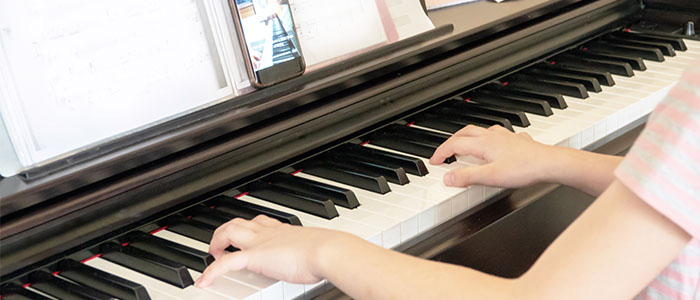Piano Lessons During Coronavirus (For Students)
Should I continue taking piano lessons right now?
With the recent development of the global pandemic "Coronavirus" (COVID-19), a lot of our normal daily routines have now changed.
Schools have been canceled. Bars and restaurants are closing. Seniors are told not to leave their homes. People everywhere are encouraged to work from home. Major health organizations and governments worldwide are encouraging or initiating quarantines and canceling public events.
The public health threat has forced a stop to many popular extracurricular activities, especially sports and most group activities. Now, as we face the possibility of weeks (or possibly months) of homebound activities, what can we do?

Music is one of the few activities that we can continue even while others must stop. In the interest of public health, education (including private music lessons) should be conducted virtually through online or video format. Modern technology has afforded us an incredible opportunity to keep learning and growing in music even while things change in the world around us.
Embrace Music
Here are just some of the many reasons to embrace music lessons during the coronavirus scare:
Video and Online Piano Lessons / Music Lessons
Technology is incredible. Without missing a beat, private music teachers everywhere are shifting their focus from in-person lessons to online or virtual lessons. There's no reason for students to miss out on continuing education when technology makes it possible.
I've already shifted all the students in my full piano studio from in-person to online lessons for the time being. We've been using Skype and FaceTime to hold lessons as usual. Many other teachers are using Zoom, Marco Polo, and other free platforms so that their students can continue learning.
Do Online Lessons Actually Work?
As someone who has been offering online makeup lessons for years, I can assure you, YES! They work! Both teacher and student can have a positive learning experience in the online/video format.
I admit I will always love in-person lessons, but online learning encourages learning in a slightly different way that can be really beneficial for the student. It forces the student to be more independent and helps expose gaps in learning that may not be as noticeable to the teacher in person. This can actually encourage even greater growth!

Lesson Format
There are several ways to structure online lessons:
How Make the Most of Online Piano Lessons
The Tech
You'll need a phone, tablet, iPad, laptop, or computer with a working microphone and camera. Make sure your device is fully charged, and have a backup device nearby just in case you need it.
Consider running a speed test on your device to test that your internet speed is ready for video. If your internet/cellular connection runs slow, limit other internet use within the home while the lesson is going on. Have other household members participate in non-internet activities (play outdoors, read a book) while the lesson is in session.
Having headphones with a microphone nearby isn't a bad idea, just in case you need them.
The Setup
Ideally, your piano teacher wants to see both your face and your hands! The easiest way to do this is to use a laptop or prop your device up on the side of the piano so that it gives your teacher a profile view. A stool, chair, books, etc. are all you need to set it up at the right angle.
If you have the resources to set up multiple cameras, a top-down view along with a facial view is great!
A note - Sometimes if a phone is set upright so that the speaker/microphone is muffled against the surface it is resting on, it creates an echo effect where the teacher hears their own voice repeated back to them. Rotating the phone sideways can prevent this.

This view is from an iPhone propped up on top of a stack of books on a chair. (Yes, it's that easy!)

Low angle setup: iPad for face view, Gooseneck iPhone or tablet holder for hands/keyboard view

Top angle setup: iPad for face view, Gooseneck iPhone or tablet holder for hands/keyboard view
Materials
Before your lesson, send your teacher images of the pieces you're working on and any completed theory pages. Your teacher may not have a copy of your pieces on hand, so this will help things go smoothly when they are not there to see your music in person.
Keep a pencil nearby, as your teacher will probably have you write things down. If your teacher usually writes in your assignment book, be prepared to write down assignments yourself.
If your teacher usually provides some materials, take the initiative to ask them if there's anything you need to get for your home. Bear in mind that they are likely shifting their whole studio to online lessons, which can be a daunting task! Anything you can do to make it easier will help you both.
Lesson Guests
Keep any distracting younger siblings or pets tucked away during the lesson. (Trust me that barking dogs and dancing toddlers are distracting to both teacher and student!)
BUT, if you can't normally sit in and your teacher is amenable, this is a great opportunity for you as a parent to watch the lesson in action! Students whose parents are involved in the lesson experience often have greater success learning piano. You'll probably learn a thing or two and be able to encourage your child that much more with their practicing.
If your child is a young student, it may be advisable for you to sit in on the lessons. Younger children are often inclined to be "squirrelly" (especially when they've been cooped up!), and your teacher will likely be grateful for your help ensuring they stay focused with the change in lesson format.
Music can be an incredible comfort in times of stress and uncertainty. I hope your piano will inspire peace and joy in your home over the coming weeks!


